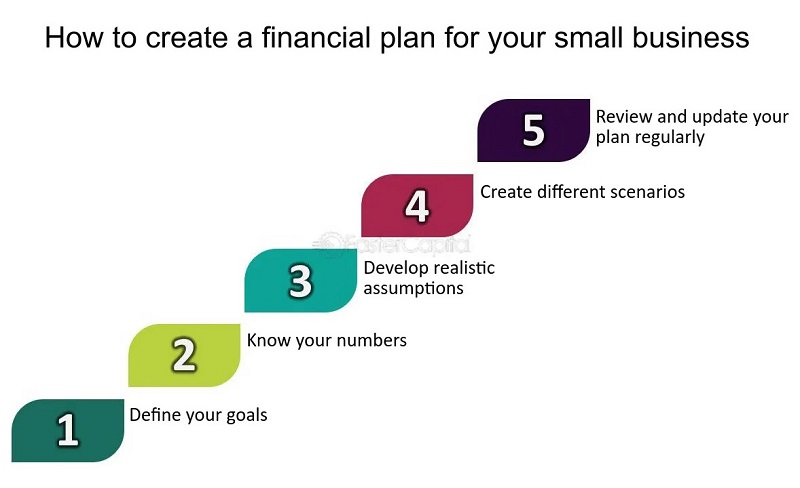
5 Crucial Retirement Planning Strategies for Small Business Owners
December 28, 2024
Grow Your Wealth: A Guide to Investing for Small Business Success
January 13, 2025Running a small business involves more than offering great products or services—it requires sound financial planning to ensure sustainability and growth. Without a clear financial roadmap, small businesses risk mismanaging cash flow, overspending, or missing opportunities for expansion. In this article, we’ll explore five essential financial planning tips to help your small business thrive.
Create a Comprehensive Budget
Budgeting is the cornerstone of financial planning for any small business. A well-structured budget serves as a roadmap, guiding you in allocating resources efficiently while keeping spending in check.
Why Budgeting Matters
- Tracks income and expenses, highlighting areas for cost-cutting.
- Ensures funds are available for critical business operations.
- Helps in planning for growth and unforeseen expenses.
Steps to Create an Effective Budget
- Assess Your Finances: Analyze historical financial data, including revenue, costs, and profit margins.
- Categorize Expenses: Divide expenses into fixed (e.g., rent, salaries) and variable (e.g., marketing, raw materials) categories.
- Set Revenue Goals: Establish realistic income targets based on market trends and past performance.
- Review and Adjust Regularly: Update your budget periodically to reflect changing circumstances or unexpected expenses.
Tools for Budgeting
Consider using financial software like QuickBooks, FreshBooks, or Wave, which can simplify budgeting, generate reports, and track expenses automatically.
Manage Cash Flow Effectively
Positive cash flow is critical for the day-to-day functioning of a business. Many small businesses fail due to cash flow mismanagement rather than a lack of profitability.
Understand Cash Flow
Cash flow is the net amount of money moving in and out of your business. Positive cash flow means you have more money coming in than going out.
Tips for Cash Flow Management
- Invoice Promptly: Send invoices immediately after services or products are delivered.
- Encourage Early Payments: Offer discounts for customers who pay ahead of schedule.
- Delay Payables Strategically: Negotiate longer payment terms with suppliers without straining relationships.
- Build a Cash Reserve: Maintain a reserve fund to handle seasonal fluctuations or emergencies.
Use Cash Flow Forecasting
Forecasting helps predict cash inflows and outflows, enabling you to plan for lean periods or capitalize on growth opportunities.
Separate Business and Personal Finances
Blurring the lines between business and personal finances is a common mistake among small business owners. This can lead to tax complications, inaccurate accounting, and even legal risks.
Why Separation Matters
- Simplifies bookkeeping and tax reporting.
- Protects personal assets from business liabilities.
- Improves your credibility with banks and investors.
Steps to Separate Finances
- Open a Business Bank Account: Choose an account that aligns with your business needs, such as one with low fees or additional services.
- Use a Business Credit Card: This helps build credit and keeps business-related expenses organized.
- Pay Yourself a Salary: Establish a consistent, reasonable salary to manage personal finances without tapping into business funds.
- Track All Transactions: Use accounting software or hire a bookkeeper to ensure all business transactions are documented accurately.

Invest in Growth Strategically
Investing in growth is essential for long-term success, but it should be done strategically to avoid overextending your resources.
Identify High-Impact Investments
- Marketing: Focus on high-ROI strategies like digital advertising, social media campaigns, or content marketing.
- Technology: Upgrade software, hardware, or automation tools to enhance productivity and reduce costs.
- Employee Training: Develop your team’s skills to improve performance and customer satisfaction.
Assess Your ROI
Before committing to any investment, analyze its potential return. For example, if you’re planning to spend $5,000 on a marketing campaign, estimate the revenue it will generate and compare it to the costs.
Plan for Expansion
If growth involves scaling operations or entering new markets, create a detailed financial plan that accounts for additional expenses like hiring, inventory, and logistics.
Explore Financing Options
- Small Business Loans: Banks and credit unions offer loans with favorable terms for expansion projects.
- Grants: Look for industry-specific grants or government programs to fund innovative ideas.
- Investors: Secure funding from angel investors or venture capitalists who share your vision.
Prepare for Taxes and Legal Obligations
Taxes and legal compliance can be overwhelming, but proactive planning can save time, money, and stress. Small business owners must stay informed about their responsibilities to avoid penalties.
Understand Your Tax Obligations
- Income Tax: Based on your business structure, you may need to pay self-employment tax, corporate tax, or individual income tax.
- Sales Tax: Ensure compliance with state or local sales tax regulations.
- Payroll Tax: If you have employees, set aside funds for Social Security, Medicare, and unemployment taxes.
Simplify Tax Preparation
- Hire an Accountant: A professional can help with tax filing, deductions, and strategic planning.
- Leverage Tax Software: Tools like TurboTax or H&R Block can simplify tax preparation for small businesses.
- Track Deductions: Common deductions include office expenses, travel, and depreciation of business assets.
Stay Legally Compliant
- Renew licenses, permits, or registrations on time.
- Understand labor laws if you employ staff.
- Regularly review contracts with suppliers, vendors, or clients to ensure compliance with terms.

Bonus Tips for Thriving Financially
1. Create an Emergency Fund
Unexpected events, such as economic downturns or equipment failures, can strain your finances. Set aside 3–6 months’ worth of operating expenses to cushion your business during tough times.
2. Conduct Regular Financial Reviews
Schedule quarterly reviews to assess performance against your financial goals. Use key metrics like profit margins, customer acquisition costs, and gross revenue to measure success.
3. Seek Expert Advice
A financial advisor or consultant can provide personalized strategies and identify areas for improvement. Their expertise ensures that your financial plans align with your business goals.
Frequently Asked Questions (FAQs)
Q: How can I improve cash flow for my small business?
A: Improve cash flow by invoicing promptly, offering early payment discounts, negotiating better payment terms with suppliers, and building a cash reserve for lean periods.
Q: Why is separating personal and business finances important?
A: Separating finances simplifies bookkeeping, protects personal assets, ensures accurate tax reporting, and improves credibility with investors and lenders.
Q: What tools can help with small business budgeting?
A: Financial software like QuickBooks, Wave, and FreshBooks offers tools for budgeting, expense tracking, and generating financial reports.
Q: How can I prepare for unexpected financial challenges?
A: Create an emergency fund with 3–6 months of operating expenses, regularly review your financial plan, and ensure you have adequate insurance coverage.
Q: What are the best tax-saving strategies for small business owners?
A: Tax-saving strategies include tracking deductions, leveraging retirement accounts like SEP IRAs, and consulting with an accountant for personalized advice.
Q: How do I determine the best growth investments for my business?
A: Assess potential ROI for each investment and prioritize areas like marketing, technology, and employee training that align with your long-term goals.
Conclusion
Financial planning is not just about managing numbers—it’s about setting your small business up for success. By creating a comprehensive budget, managing cash flow, separating finances, investing strategically, and staying compliant with tax and legal obligations, you can ensure your business thrives in a competitive market. Remember, sound financial practices today pave the way for a prosperous future.
Resources
- Cash Flow Frog is a cash flow forecasting software designed to help small businesses manage and predict their cash flow effectively.
- Sage offers cash management software that enhances visibility, optimizes working capital, and simplifies cash flow forecasting for businesses.
Xero’s Guide on Managing Cash Flow
- Xero provides a comprehensive guide on managing cash flow, offering practical tips and strategies for small business owners.
DISCLAIMER: The information in this article is for informational purposes only and is not meant to take the place of legal and accounting advice.



